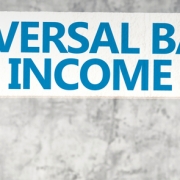Market advocates usually tend to reject any sort of system that seeks to rob from one individual in order to give to another. Yet, when it comes to the welfare state, some who align themselves with free enterprise support the idea of a universal basic income (UBI).
It is believed by some that a UBI would be the best possible way to limit the welfare state without clinging to the more idealistically pure view that it should be abolished altogether. It is reasoned that since the government is likely to continue taking from us anyway, we may as well mitigate the costs by giving each individual a fixed amount of money each year.
This great libertarian divide on the issue of the UBI is not one that is exclusive to our modern day.
By providing each individual with the same amount of money, let’s say $10,000 a year as has been suggested by some, income is at least being equally distributed, it is argued. And without a labyrinth of other welfare programs, a UBI could actually decrease the welfare state.
And even though recent research and studies conducted on the matter have yielded results less than favorable to UBI champions, there are still those in the free market camp who continue to advocate for it.
But this great libertarian divide on the issue of the UBI is not one that is exclusive to our modern day. In fact, both Milton Friedman and F.A. Hayek showed support for this type of system in their own time. Hayek even dedicates much of his ninth chapter inThe Road to Serfdom to this topic as he discusses the always-timely debate between liberty and security.
Economic Security
Libertarians are especially guilty of using the Ben Franklin quote warning against hastily trading liberty for security as often as is humanly possible. In a post-9/11 world, this issue of liberty vs. security has become all-too applicable as young people have lived the majority of our lives in a world absent of our most precious civil liberties.
As the quote says:
Those who would give up essential Liberty, to purchase a little temporary Safety, deserve neither Liberty nor Safety.”
But there is more to this liberty vs. security issue than just civil liberties. Though to be sure, all liberties are related to each other. But in true Hayek form, he uses the “Security and Freedom” chapter of his book to discuss the importance of economic liberty.
Hayek believes that there are essentially two types of economic security: limited and absolute.
“It will be well to contrast at the outset the two kinds of security: the limited one, which can be achieved for all, and which is therefore no privilege but a legitimate object of desire; and absolute security, which in a free society cannot be achieved for all and which ought not to be given as a privilege—except in a few special instances such as that of the judges, where complete independence is of paramount importance.”
But what he neglects to place on the table for consideration is the very real fact that no amount of security can ever be guaranteed in a society comprised of individual actors. True liberty will always be a risk because it acknowledges that you cannot guarantee security without first stripping people of their liberties and using force.
Instead, Hayek makes arguments in favor of “limited” economic security being compatible with free enterprise. “But there is no incompatibility in principle between the state’s providing greater security in this way and the preservation of individual freedom,” Hayek says very early on in this chapter.
He continues:
Nor is there any reason why the state should not assist the individuals in providing for those common hazards of life against which, because of their uncertainty, few individuals can make adequate provision.”
There are two problems with this statement. First, as discussed in previous liveblog entries, Hayek has already made the case that it is hard to restrain governments once it is given a little power. So this is a very slippery slope to descend.
It also neglects the very real fact that in order to supply individuals with their basic needs, money is required. And that money has to come from somewhere. Since the government itself provides no good or service that brings in profit, the money to fund such a program would have to come at the expense of the taxpayers. In other words, it involves theft at the hand of the government.
In fact, a recent study conducted on the impacts of a implementing a UBI within the US found that:
When paying for the policy by increasing taxes on households rather than paying for the policy with debt, the policy is not expansionary. In effect, it is giving to households with one hand what it is taking away with the other. There is no net effect.”
Hayek makes arguments in favor of “limited” economic security being compatible with free enterprise.
So not only does this type of system advocate institutionalized theft, it also claims to solve a problem that, in fact, it does not impact. Since this money needed to fund a UBI either comes from raising taxes on individuals or increasing the deficit, it is not saving anyone any money.
The Fear of Technological Progress
As part of his argument in favor of this type of system, Hayek addresses the fact that oftentimes, advancement in technology results in a loss of employment for many workers who are skilled in one very specific area. Since this progress has come at no fault of their own, Hayek argues that the government should ensure that they are not experiencing a loss of income.
We all know the tragic plight of the highly trained man whose hard-learned skill has suddenly lost its value because of some invention which greatly benefits the rest of society. The history of the last hundred years is full of instances of this kind, some of them affecting hundreds of thousands of people at a time.
He continues:
That anyone should suffer a great diminution of his income and bitter disappointment of all his hopes through no fault of his own, and despite hard work and exceptional skill, undoubtedly offends our sense of justice.”
This is all-too applicable in our modern climate when fear of automation has been used to advocate for a UBI. Big names in the tech world like Mark Zuckerberg and Bill Gates have both used the increased use of automation to say that now, more than ever, a universal basic income would be most needed.
Life has forward motion and is never static, never stuck in one place.
It is undeniable that automation will inevitably put some individuals out of work just as machines put laborers out of work during the industrial revolution. If automation proves itself to be more efficient and less expensive than human workers, it would be foolish for companies not to move towards this system.
But by creating a UBI as a safety net, the state is essentially incentivizing individuals to stay stagnant and abandon the endeavor of learning new skills that may help them create value in the workforce. Nothing in life is set in stone. What is here today might be gone tomorrow. No amount of false reassurance can avoid this fact.
Careers are no different. If your skills are not in demand because of technological advances, then one must learn a new skill and create value in a different sector. While technological progress does come with initial job displacement in certain sectors, there are still others sectors in need and new niches that have not yet been capitalized on. Whole new industries, sectors, job opportunities emerge, providing new hope to people who are seeking work, and, let us not forget, serving people as consumers who are seeking better lives.
Ensuring that no matter what happens, the government will provide for you diminishes the incentive to constantly expand your skills in order to create as much value as is possible. In fact, it is an illusion: life has forward motion and is never static, never stuck in one place.
But on this point, Hayek disagrees:
Although the results achieved will often be commensurate with efforts and intentions, this cannot always be true in any form of society. It will particularly not be true in the many instances where the usefulness of some trade or special skill is changed by circumstances which could not be foreseen.”
Most of life’s events are unforeseen. Life is, unfortunately, unfair and it is not the responsibility of others to remedy life’s unsavory moments. What we need most of all is the freedom to adapt, to evolve, to become something that is valued by others. This is precisely what is provided by the market economy, the most benevolent institution that exists on this earth.
The Problems
Hayek is by no means intellectually lacking in the area of economics. And while he mistakenly accepts the UBI as a reasonable free market solution to the welfare state, he is also aware of the problems that may arise under this system.
When a person’s income is guaranteed, he can neither be allowed to stay in his job merely because he likes it nor to choose what other work he would like to do. As it is not he who makes the gain or suffers the loss dependent on his moving or not moving, the choice must be made for him by those who control the distribution of the available income.”
Speaking to the point made above, Hayek addresses the fact that a UBI does come with the very real risk that an individual will have no incentive to improve their life. When needs are being met with or without any effort on your own part, the desire to improve one’s station in life becomes less important.
Ending this chapter Hayek states:
Some security is essential if freedom is to be preserved, because most men are willing to bear the risk which freedom inevitably involves only so long as that risk is not too great.
Though he is quick to add:
But while this is a truth of which we must never lose sight, nothing is more fatal than the present fashion among intellectual leaders of extolling security at the expense of freedom.”
In short, while economic security may be appealing to many and ease our minds, it does not come without a cost, and, in most instances, it is a loss to not only our economic freedom but freedom in general.








